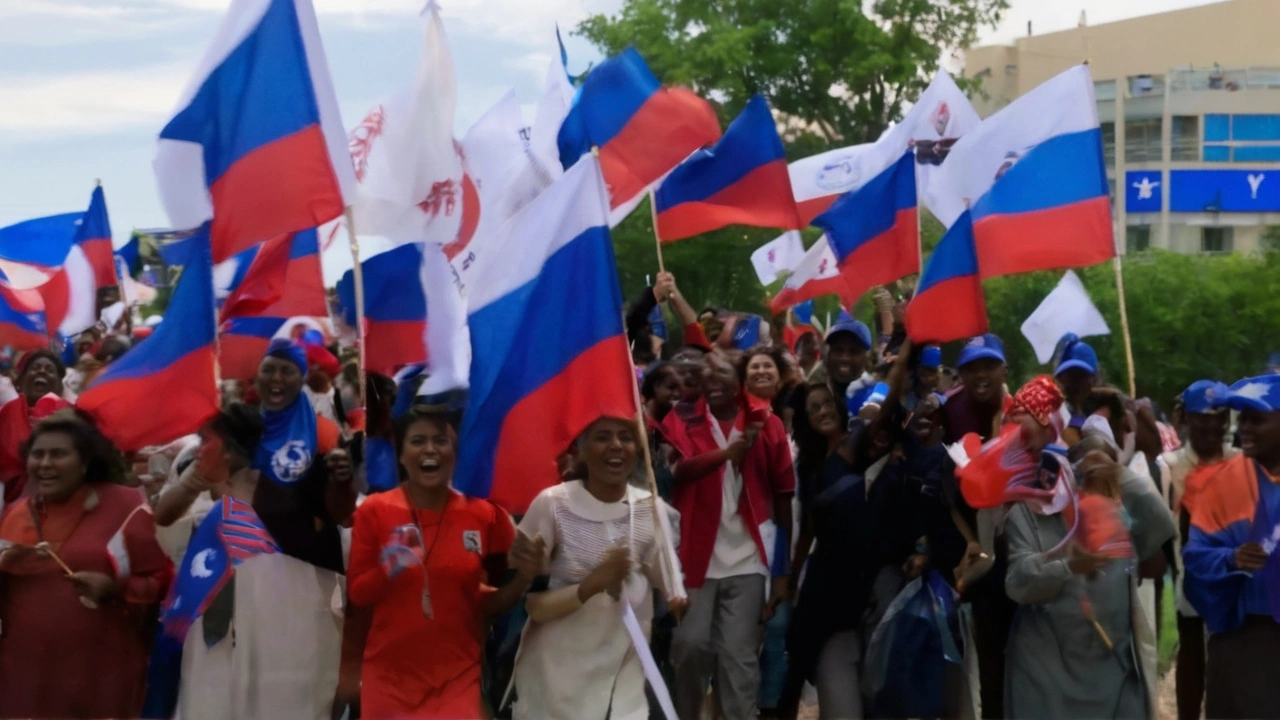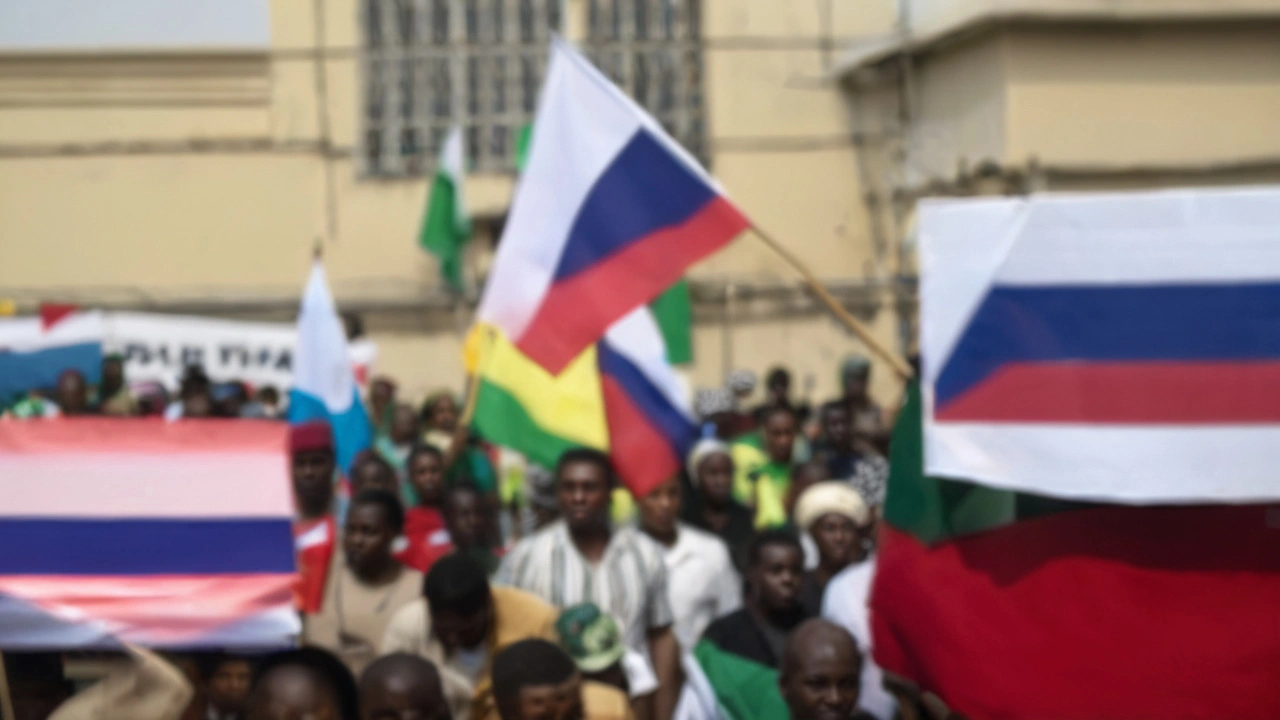6 Aug 2024
- 18 Comments
Protesters Display Nigerian Military Flags, Authorities Wrongfully Claim Russian Flags
In a dramatic turn of events in Nigeria, protesters have been spotted displaying Nigerian military flags, refuting earlier accusations by authorities that they were waving Russian flags. The protesters' actions form part of a wider movement aimed at demanding significant political changes and reforms in the country. This revelation holds the potential to reshape the ongoing political discourse significantly, showcasing a deep desire for improved governance and security among the Nigerian populace.
Authorities' Controversial Accusations and Eyewitness Accounts
Authorities initially accused the demonstrators of waving Russian flags, a claim that stirred considerable controversy and insinuated foreign interference in local political matters. Such allegations are often sensitive, given the geopolitical implications, especially in an era where foreign influence and meddling in domestic affairs are hot topics globally. However, these accusations have been thoroughly debunked by eyewitness testimonies and video footage, showing that the banners were, in fact, Nigerian military flags.
The eyewitneses and the footage provide concrete evidence that challenges the narrative put forth by authorities. It's a stark reminder of the importance of vigilant journalism and accurate reporting. Inaccurate claims, whether deliberate or mistaken, can skew public perception and potentially lead to unwarranted conflicts or sentiments. Thus, the role of the media in ensuring truths are reported cannot be overstated.
Symbolism Behind Nigerian Military Flags
The use of Nigerian military flags by the protesters is steeped in symbolism. It draws attention to their demand for stronger governance and better security measures. The military, for better or worse, occupies a significant place in Nigeria's socio-political landscape. By adopting the military flag, protesters are likely signaling their call for the military's integrity and protection, demanding that it aligns with the principles of democracy and public service.
Furthermore, this move could also be interpreted as a call for the military to play a more constructive role within the nation's political arena. The protesters may be urging military leaders to act as custodians of democratic values and to support the push for political change rather than upholding the status quo.
Implications for Nigerian Political Discourse
This incident comes at a critical juncture, shedding light on the broader issues plaguing Nigerian politics. The accusations and the subsequent clarification expose the mistrust between the citizens and the authorities. It emphasizes the need for transparency and open dialogue at a time when political tensions are inflamed. The protesters' true intent, now laid bare, injects a new dimension into the ongoing debate about Nigeria's future.
Challenges to the Authorities' Narrative
The authorities' initial narrative about the Russian flags was not merely a minor error; it presented a potentially dangerous narrative. Foreign nations' involvement in local political issues can carry significant implications, and the premature allegations were likely to rise suspicions and escalate tensions. The revelation, therefore, challenges the credibility of the authorities and underscores the necessity of careful and substantiated claims, particularly in sensitive political climates.
Moreover, it provides a lens through which we can scrutinize the motives behind such narratives. Was this a simple mistake, or was there an attempt to discredit the protesters and divert focus from their legitimate demands? This makes the role of an unflinching, honest, and investigative press even more critical.
Debate on the Role of the Military in Nigerian Politics
This situation reignites discussions about the military's place in Nigerian politics. Historically, the Nigerian military has played a prominent role, with several coups and interventions marking its political journey. The current demand by the public involves wanting the military to act as a stabilizing force to support democratic processes and address security issues, while refraining from political overreach.
With the protest and the symbol of the military flag, it is implied that the public sees the military not as an antagonistic force but as a potential ally. An ally that could help in steering the nation toward a more democratic and secure future, if it commits to honoring its duty to protect and serve genuinely.

Final Thoughts
The unfolding events and the truths that have come to light from the protests in Nigeria are a potent reminder of the complexities within political movements and the narratives that surround them. The shift from a foreign flag misconception to the patriotic display of the Nigerian military flag highlights the nuanced demands of the protesters and the critical need for accurate, transparent information.
As Nigeria continues to grapple with its political challenges, the symbolism and the underlying messages from these protests could play a pivotal role in shaping the nation's path forward. It also reminds us of the power of the common citizenry, whose voices and actions, when accurately conveyed, can uphold the true aspirations of a nation's people.


Hartwell Moshier
August 6, 2024The facts speak for themselves.
Jay Bould
August 15, 2024It's fascinating how symbols can bridge cultures and histories. The Nigerian military flag carries deep meaning for the people, reflecting both pride and a call for security. When protesters use it, they're speaking in a language that resonates across borders. I hope this dialogue encourages more understanding worldwide.
Mike Malone
August 24, 2024The deployment of indigenous symbols in protest movements invites a profound contemplation of collective identity. In the Nigerian context, the military flag is not merely fabric; it embodies a historical narrative of authority and protection. When citizens brandish this emblem, they implicitly question the very parameters of state legitimacy. Such an act reverberates beyond mere visual display, touching upon the philosophical underpinnings of social contract theory. The state's claim of foreign influence via alleged Russian flags reflects an attempt to externalize internal dissent. By correcting this narrative, the protestors reaffirm the principle of self-determination that undergirds democratic societies. Moreover, the insistence on accurate representation underscores the indispensable role of truth in political discourse. It is tempting to view symbols as static, yet they are dynamic, reshaped by the intentions of those who wield them. This dynamism illustrates the fluidity of power, whereby the populace can appropriate a symbol of authority to demand accountability. The interplay between the military's institutional role and civilian expectations further complicates the narrative. While the armed forces have historically been both protectors and political actors, contemporary protestors seek a recalibration toward democratic oversight. The juxtaposition of reverence for the flag and criticism of state policies reveals a nuanced stance rather than outright antagonism. In this light, the protests serve as a crucible for redefining the social contract between the Nigerian state and its citizens. They also remind observers worldwide that the symbols of sovereignty are subject to reinterpretation when confronted by popular will. Ultimately, the episode underscores that truth, when upheld by vigilant witnesses, can dismantle fabricated narratives and foster a more transparent political arena.
Pierce Smith
September 2, 2024While we dissect the symbolism, let us remember that constructive dialogue remains paramount. The protesters' choice to display the national military flag can be seen as an earnest appeal for reform, not a hostile challenge. In the spirit of mutual respect, authorities ought to engage rather than deflect with unsubstantiated claims. A balanced approach benefits both the state and its citizens, fostering trust and progress.
Abhishek Singh
September 12, 2024Oh sure, blaming Russia was just the easiest way to avoid looking at home.
hg gay
September 21, 2024Absolutely, the clarity of the evidence is striking 😊. Eyewitness videos and photos leave no room for doubt, and they highlight how crucial transparent communication is in maintaining public trust. It's heartening to see citizens and journalists alike standing up for truth, especially when misinformation threatens to cloud the narrative. Let’s keep amplifying these authentic accounts so that the real story reaches everyone 🙌.
Owen Covach
September 30, 2024The flag fluttered like a burst of sunrise over the crowd, painting hope across the streets with every ripple of fabric.
Pauline HERT
October 9, 2024It’s high time the government stops hiding behind foreign scapegoats and faces the real issues at home.
Ron Rementilla
October 18, 2024The symbolism you mention isn’t just decorative; it’s a direct plea for security and accountability, and it demands immediate governmental attention.
Chand Shahzad
October 27, 2024Friends, let us channel this momentum into constructive channels. By engaging in informed discussions and supporting peaceful demonstrations, we can drive the reforms that many Nigerians deserve. Unity and clarity will pave the way for lasting change.
Eduardo Torres
November 5, 2024Positive change is always possible when voices are heard and respected.
Emanuel Hantig
November 14, 2024Seeing the community rally around their own symbols reminds us that collective identity can be a powerful catalyst for societal transformation. When people feel seen and understood, the floodgates of meaningful dialogue open, allowing for deeper reflection on governance and shared values. 🌟
Byron Marcos Gonzalez
November 23, 2024Behold, the theater of politics where flags become actors, and the stage is set for a grand saga of truth versus illusion.
Chris Snyder
December 2, 2024Indeed, the visual evidence offers a concrete basis for analysis. The footage clearly shows the Nigerian military insignia, debunking the foreign flag theory and reinforcing the need for careful source verification.
Hugh Fitzpatrick
December 11, 2024Well, if the authorities can’t even get their own flags right, maybe they should stick to simpler tasks.
george hernandez
December 20, 2024When the public steps forward with undeniable proof, it not only clarifies the situation but also empowers the broader movement. The vivid display of the national flag serves as a rallying point, uniting diverse voices under a common cause. Such visual affirmation can energize participants, reminding them of their shared purpose and the stakes involved. Moreover, it places a responsibility on officials to respond with sincerity rather than diversion. By acknowledging the factual grounding, leaders have an opportunity to rebuild credibility. The media’s role, too, becomes crucial in amplifying these truths and ensuring that misinformation does not take root. In essence, the combination of citizen vigilance and transparent reporting creates a robust defense against fabricated narratives. Let us all continue to champion accuracy and collective agency in shaping Nigeria’s future.
bob wang
December 29, 2024Indeed; the arguments presented are both cogent and compelling; it is incumbent upon all stakeholders to prioritize verifiable evidence; the integration of factual clarity undoubtedly fortifies democratic discourse. 😊
Seyi Aina
January 7, 2025Honestly, the whole flag mix‑up shows how sloppy some officials are-just admit the mistake and move on.